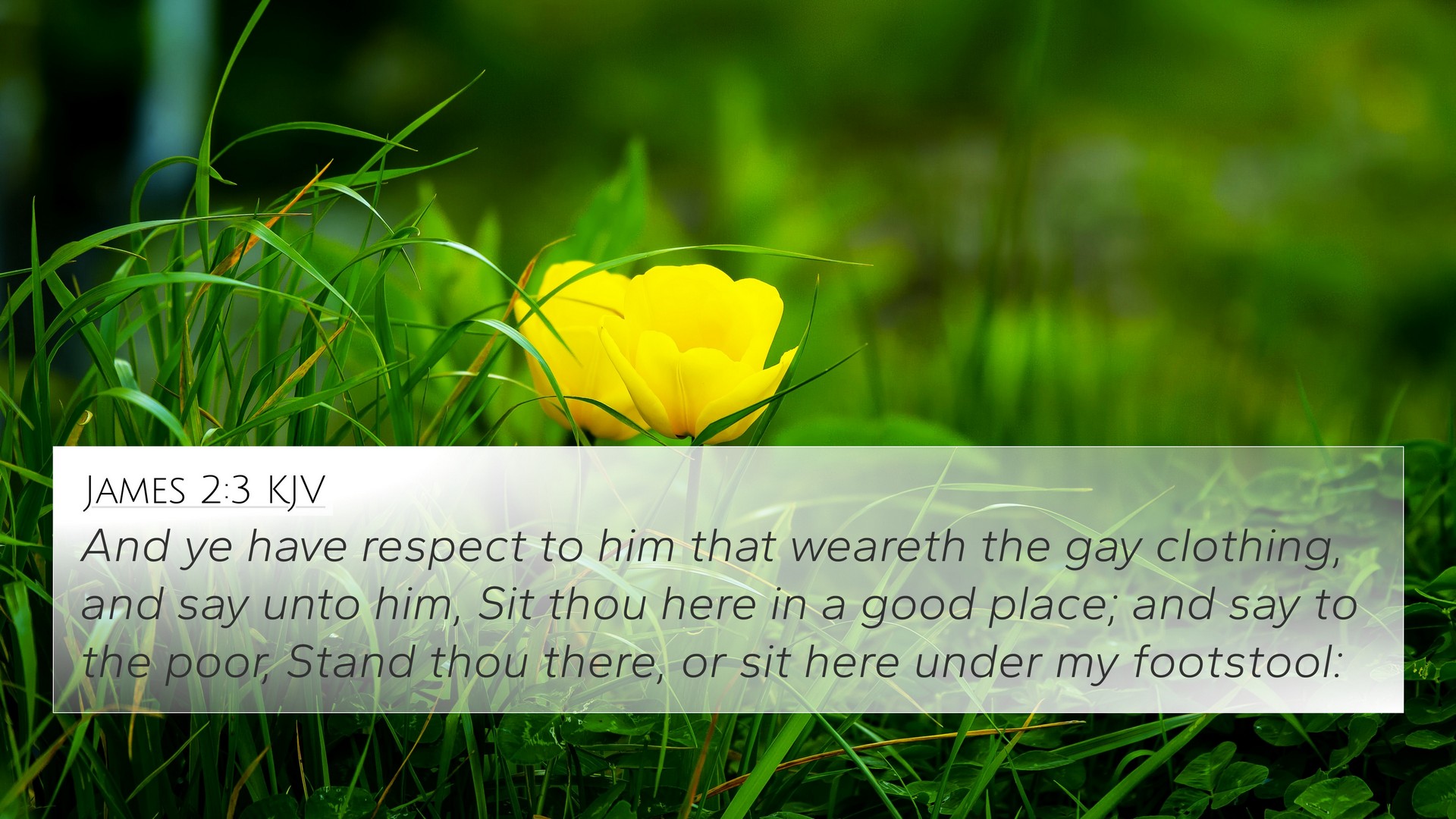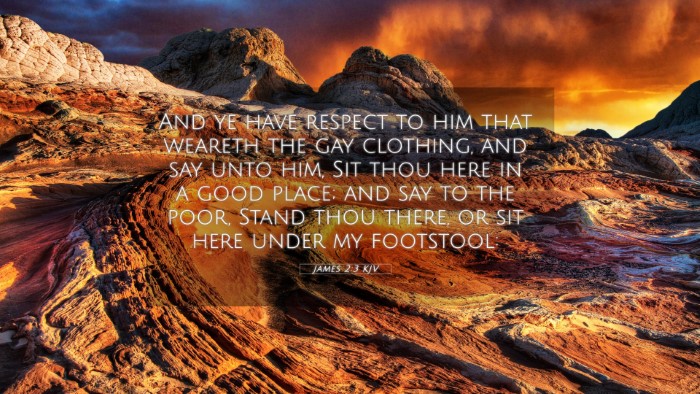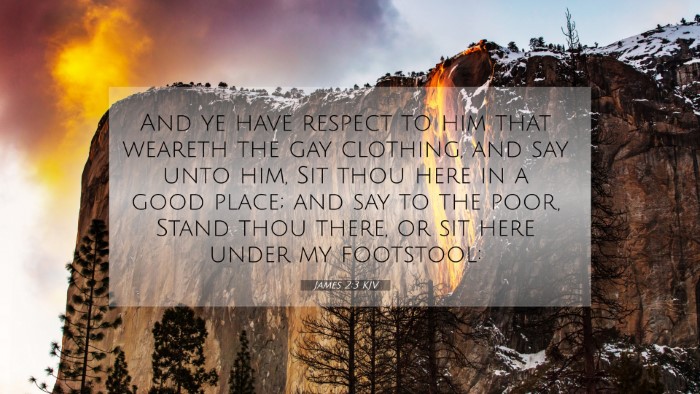Old Testament
Genesis Exodus Leviticus Numbers Deuteronomy Joshua Judges Ruth 1 Samuel 2 Samuel 1 Kings 2 Kings 1 Chronicles 2 Chronicles Ezra Nehemiah Esther Job Psalms Proverbs Ecclesiastes Song of Solomon Isaiah Jeremiah Lamentations Ezekiel Daniel Hosea Joel Amos Obadiah Jonah Micah Nahum Habakkuk Zephaniah Haggai Zechariah MalachiJames 2:3 Similar Verses
James 2:3 Cross References
And ye have respect to him that weareth the gay clothing, and say unto him, Sit thou here in a good place; and say to the poor, Stand thou there, or sit here under my footstool:
Uncover the Rich Themes and Topics of This Bible Verse
Listed below are the Bible themes associated with James 2:3. We invite you to explore each theme to gain deeper insights into the Scriptures.
James 2:3 Cross Reference Verses
This section features a detailed cross-reference designed to enrich your understanding of the Scriptures. Below, you will find carefully selected verses that echo the themes and teachings related to James 2:3 KJV. Click on any image to explore detailed analyses of related Bible verses and uncover deeper theological insights.
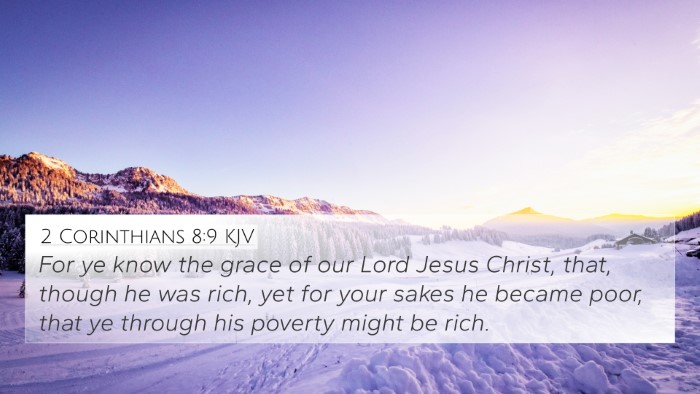
2 Corinthians 8:9 (KJV) »
For ye know the grace of our Lord Jesus Christ, that, though he was rich, yet for your sakes he became poor, that ye through his poverty might be rich.
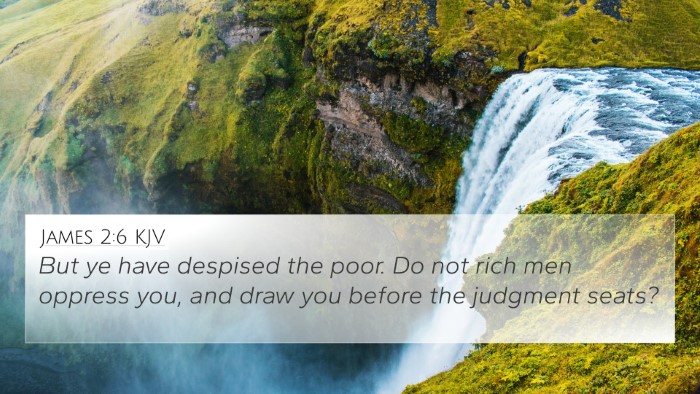
James 2:6 (KJV) »
But ye have despised the poor. Do not rich men oppress you, and draw you before the judgment seats?
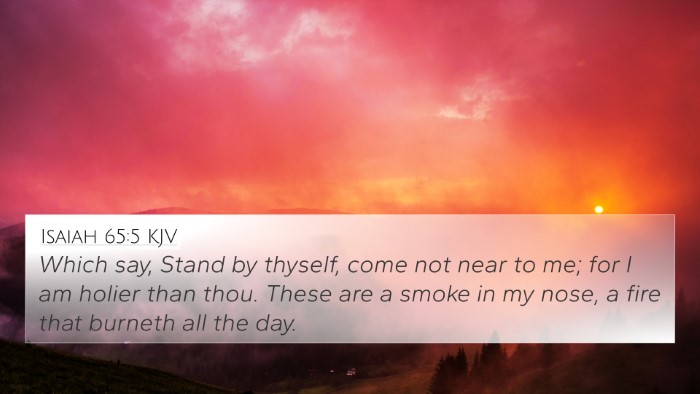
Isaiah 65:5 (KJV) »
Which say, Stand by thyself, come not near to me; for I am holier than thou. These are a smoke in my nose, a fire that burneth all the day.

Luke 7:44 (KJV) »
And he turned to the woman, and said unto Simon, Seest thou this woman? I entered into thine house, thou gavest me no water for my feet: but she hath washed my feet with tears, and wiped them with the hairs of her head.
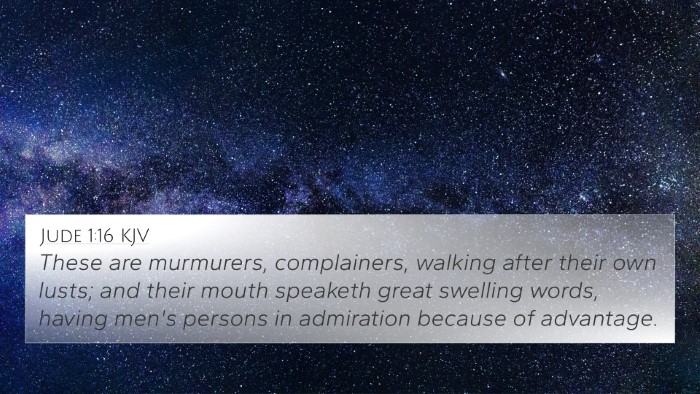
Jude 1:16 (KJV) »
These are murmurers, complainers, walking after their own lusts; and their mouth speaketh great swelling words, having men's persons in admiration because of advantage.
James 2:3 Verse Analysis and Similar Verses
Understanding James 2:3
James 2:3 states: "And you pay attention to the one wearing the fine clothes and say to him, 'You sit here in a good place,' and say to the poor man, 'You stand there,' or 'Sit here at my footstool.'"
This verse addresses the issue of favoritism within the Christian community. James emphasizes the moral flaw of showing partiality based on outward appearances, particularly wealth and social status. The underlying intention is to promote equality and unity among believers.
Commentary Insights
Matthew Henry’s Commentary
Matthew Henry explains that this verse illustrates the sin of judgment based on outward appearances. He emphasizes that such favoritism is shameful as it demonstrates a lack of genuine love and kindness. Rather than honoring the rich, Christians should recognize the inherent value of every individual, regardless of their societal position.
Albert Barnes’ Notes
Albert Barnes details how this behavior contradicts the teachings of Christ, who often advocated for the marginalized. He stresses that showing partiality not only leads to injustice but also undermines the faith of believers. In this context, the rich are often seen as oppressors and should not receive preferential treatment.
Adam Clarke’s Commentary
Adam Clarke notes that the instruction here is not merely about the actions surrounding social status but speaks to the broader implications of judgment within the church. He warns against the tendency to disregard the poor while favoring the rich and strong, urging believers to cultivate an environment that reflects Christ's love for all.
Bible Verse Cross-References
This verse connects to several other passages emphasizing themes of equality and justice:
- Galatians 3:28: "There is neither Jew nor Greek, neither slave nor free, nor is there male and female, for you are all one in Christ Jesus."
- 1 Samuel 16:7: "But the LORD said to Samuel, 'Do not look at his appearance or at his physical stature, because I have refused him. For the LORD does not see as man sees; for man looks at the outward appearance, but the LORD looks at the heart.'
- Romans 2:11: "For there is no partiality with God."
- Proverbs 22:2: "The rich and the poor have this in common: The LORD is the Maker of them all."
- Luke 14:13-14: "But when you give a feast, invite the poor, the maimed, the lame, the blind. And you will be blessed, because they cannot repay you; for you shall be repaid at the resurrection of the just."
- Acts 10:34: "Then Peter opened his mouth and said: 'In truth I perceive that God shows no partiality.'
- Matthew 22:16: "...Teacher, we know that you are true and teach the way of God in truth; nor do you care about anyone, for you do not regard the person of men."
Thematic Connections
The thematic analysis of James 2:3 encourages readers to reflect on the broader implications of favoritism throughout the scriptures.
- Unconditional Love: The theme of loving one's neighbor resonates throughout the Bible, reminding us of the command to love without condition.
- God's Justice: Numerous verses reflect God’s desire for justice and righteousness, further condemning favoritism and inequality.
- Christian Conduct: The call to a moral and ethical lifestyle is frequent. James' warning ties into the overarching core values woven throughout Biblical teachings.
Applying James 2:3 Today
In today's context, the message of James 2:3 remains relevant. Believers are called to transcend societal divisions and treat everyone with respect and dignity. This verse encourages believers to evaluate their attitudes and actions toward others, ensuring that love governs their interactions.
Conclusion
Ultimately, James 2:3 serves as a reminder of the equal value of every person in the eyes of God. By avoiding partiality, Christians fulfill the command to love others as themselves, thereby reflecting the heart of Christ in a world often divided by status and wealth. Understanding and applying the insights from this verse not only strengthens personal faith but also fosters a community embodying the principles of equality and justice.
